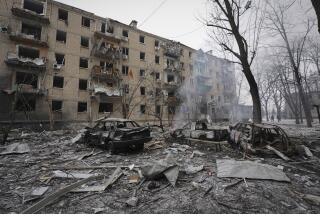America Must Not Abandon the Kurds
- Share via
In 1991, much of Saddam Hussein’s military strength was spared from destruction in Desert Storm when President Bush decided not to disarm Iraqi military units isolated by the U.S.-led coalition. This enabled Saddam to wreak carnage among Iraq’s Kurds and Shiites.
After thousands were massacred and more than 1 million Kurds fled into the mountains of Turkey and Iran, a U.N. safe area was declared in northern Iraq. The United States indicated to the Kurds that the zone would be defended.
Now, five years later, Saddam has ripped through the safe area under the pretext of an invitation by Kurdish leader Massoud Barzani. Iraqi forces are led by the infamous Ali Hassan Majid, who directed the gassing of Kurdish villages in 1988. Saddam proclaimed an amnesty for the Kurds now back under his control, but excluded Iraqis who worked with the U.N. and nongovernmental relief organizations--a chilling exception. Other exceptions are sure to follow, including anyone remotely perceived to be an enemy of Saddam. And the American public suddenly hears from the administration that U.S. interests lie only in the south.
Saddam’s security services are hunting down the non-Barzani Kurdish leadership, some of whom apparently received CIA funding, as well as Arab opposition leaders. There are reports of executions. About 1,500 of the Arabs have been taken to Baghdad for questioning.
Along with Saddam’s secret police, it is highly likely that Iraqi military units remain in northern Iraq, disguised as Kurds; there are reports of tailor shops busy with orders to provide Kurdish garb for the Iraqi military.
While we should not underestimate the Kurds’ propensity to fight among themselves, Barzani’s defection may have been triggered by U.S. reneging on operational aspects of “Operation Provide Comfort”--the Kurdish relief plan fashioned by the U.S. and its Gulf War allies. U.S. policy suffered from general inattention and drift, but did involve mediation between the warring Kurdish factions led by Barzani and Jalal Talabani; that effort was abandoned, apparently for lack of funds.
U.S. weakness on Iraq has been bipartisan. Republicans, whose president should have dismantled the Iraqi military, now blame Clinton for not hitting Saddam harder. Democrats say there is no international support for moving against Saddam, which of course is self-fulfilling in the absence of U.S. leadership.
Meanwhile, almost nothing is said about how to protect the Kurds, who are in a highly vulnerable position. Their protection would mean forcing Saddam to withdraw from northern Iraq, thus permitting displaced Kurds to return home and averting a new Kurdish exodus.
We therefore recommend that the following actions be taken at once:
* The relevant relief agencies (particularly the U.N.) should restore international protection and assistance for the Kurds in northern Iraq to the same level as before Saddam’s invasion. Additional resources may be needed to make up for the reduced U.S. relief operation.
* The U.S. government should evacuate employees of nongovernmental agencies associated with the American relief effort, as it has begun doing for its direct employees.
* Iran and Turkey should, as they have in the past, welcome humanitarian assistance to the displaced Kurds along their borders and admit Kurdish refugees. Because both of these countries, especially Iran, already have done a great deal to host refugees, additional international resources should be made available to support relief efforts in the border cities.
* International representatives on the ground must compile a full accounting of the missing.
* The international community must insist that Iraqi forces, particularly heavy weapons (it is difficult to believe claims that these belong to the Barzani forces) be removed from northern Iraq.
* The United States must redouble its efforts to broker a rapprochement between the Kurdish factions. One hopeful sign was the announcement Tuesday that Barzani would hold talks in Turkey this week with Robert Pelletreau, the assistant secretary of state for Near Eastern affairs. The cost of such peacemaking efforts is paltry compared with the costs of further conflict or renewed oppression by Saddam’s regime.
Oil may be the United States’ strategic interest, but international standing and our own self-respect demand that we recommit ourselves to continuing the protection for the Kurds established five years ago. An America perceived as weak by the international community cannot protect its oil or any other of its vital interests.
More to Read
Sign up for Essential California
The most important California stories and recommendations in your inbox every morning.
You may occasionally receive promotional content from the Los Angeles Times.












